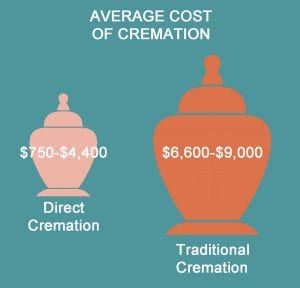Cost of Cremation – Understanding the Prices

Asking how much cremation costs sounds like a straightforward question. Unfortunately, it’s not as simple as it sounds.
The actual price of a cremation will depend on where you live and what type of services you choose. Even within your local area, prices vary widely depending on your selected provider. For example, the cost of a simple cremation with the remains returned to the family will cost significantly less than having a full funeral with the body present before cremation. The good news is you can get a good idea of the range of prices so you can avoid sticker shock when you start shopping for cremation services.
Average Cost of Cremation

On a national level, the average cost of a direct cremation is $750 on the low end and $4,400 on the high end. Clearly, a range that wide isn’t very helpful. But, unfortunately, there is a wide variation in prices from state to state, city-to-city, and even within a given metropolitan region. Depending on where you live, you may find a simple cremation (no viewing or ceremony) for as little as $600. That would be on the low end, however. On the other hand, in a big urban area in an expensive area of the country, like Boston or New York City, you may have difficulty finding something for less than a few thousand dollars. That’s why it’s so important to shop around.
Low-Cost Cremation
You can find reasonably priced cremation services despite the lack of standard cremation pricing. Of course, planning ahead is going to be your best strategy for saving money, but even when you don’t have the luxury of time, you can find cremation that won’t break the bank.
Direct Cremation
Direct cremation is the most economical type of cremation. Prices can range widely, but you can generally expect to pay $1,500-$2,500 for a direct cremation.
Simply put, with direct cremation, there is no memorial service and no funeral. The deceased is transported directly to the crematorium, and the remains are returned to the family in a temporary container. The following elements are generally included in the cost of a direct cremation:
- Transportation of the deceased from the place of death or funeral home to the crematorium.
- Body preparation, if any. For example, medical devices, metals, and any other non-combustible materials will be removed. There is no embalming.
- Handling any necessary permits and paperwork. There may be an extra charge for providing copies of the death certificate.
- An “alternative container” for the body. This is usually a combustible container made of sturdy cardboard.
- Use of the cremation chamber for the actual cremation.
- Return of the remains to the family or loved ones in a basic box or urn.
Once you have given your authorization for the cremation to take place and signed a contract for payment, the funeral director or cremation provider will handle all the details.
Traditional Cremation
Traditional cremation refers to cremation where a funeral (the body is present) or memorial service is included. This type of cremation is sometimes called classic cremation or full-service cremation.
In most cases, traditional cremation is arranged through a funeral home. Costs vary widely since every funeral home designs packages differently. On average, a traditional cremation will cost $3,000-6,000. The exact price will depend on the services you choose. Visitation and viewing, for example, add to the cost. If you choose to have a funeral or viewing, you may be required to purchase embalming. This adds to the cost of cremation.
A typical traditional cremation package will usually include:
- Basic services of the funeral director and funeral home staff.
- Transportation of the deceased from the place of death or funeral home to the crematorium.
- Embalming and/or body preparation.
- Handling any necessary permits and paperwork.
- An alternate container or casket for the body. The casket may be an upgrade.
- Use of the cremation chamber for the actual cremation.
- Disposition of the body (burial or mausoleum) or return of remains to the family.
It especially important that you know what you are buying when you choose traditional cremation. Request an itemized price list and ask lots of questions.
No Cost Cremation
One way to avoid the cost of cremation is to donate your body to science. Once the medical facility has completed the research, the remains are cremated, and the ashes returned to the family.
However, it is important to know that body donation must be arranged before death, and not everyone is a suitable candidate for donation.
>> Click to learn more about donating your body to science.
Your Rights as a Consumer
The funeral industry is a heavily regulated industry. There are protections in place to help consumers ensure that they get the information they need to make an informed decision. State law governs most funeral regulations. However, the Federal government does get involved through The Funeral Rule. The Funeral Rule is a comprehensive law that is administered by the FTC. Some of the most important protections you should be aware of are the right to:
- Purchase just the funeral products and services you want.
- Decline embalming.
- Purchase an urn or casket from a third party.
- Use an alternative container rather than a casket for cremation.
- Get price information by phone.
- Get a written, itemized price list for services.
- See a list of casket and outer burial container pricing before viewing actual caskets.
- Receive a written statement of your selected services and products before you pay for them.
- Get a written explanation of any legal rules for the cemetery or crematory that require the purchase of specific goods or services.
For a complete discussion of your rights, visit our Funeral Rule Page.
Paying for cremation
Once you have determined what type of cremation you want and you are certain of the cost of cremation, you have one final task. You need to decide how you will pay for it.
In the best of all worlds, you’ll have money set aside for all your final expenses. But what if you don’t? We can help. We have a comprehensive set of resources to help.
- Paying for a Funeral
- Funeral Insurance
- Funeral Loans
- Crowdfunding
- Getting Federal Assistance
- Getting State Assistance
Memorializing Your Loved One
Many people are concerned that they will not be able to provide an adequate send-off for their loved one when they choose cremation. The truth is, when you opt for a cremation, you have nearly unlimited choices on how you can celebrate the life of the person.
You always have the option to have a funeral prior to the cremation. However, if you’d prefer to have a direct cremation, you can have whatever type of memorial service you’d like. The service can take place before burying the ashes with the urn on display if that’s the way you’d like to take care of the final disposition.
Many people choose to have a memorial service or celebration of life without the ashes present. In these cases, you can create a beautiful ceremony that celebrates the life. We suggest that you visit our Celebration of Life pages to learn more about your options.
Questions to Ask About Cremation Before You Buy
With so many options available, it’s easy to see why buying cremation services can be a stressful process. It is difficult to compare prices, and there are many terms that are unique to the industry. The best thing you can do is set a budget before you start to shop, take your time, and ask lots of questions. Below are some of the questions to ask before you buy.
Questions to ask before you buy:
- What products and services are included in the price?
- Are there required items that must be purchased in order to comply with laws or regulations?
- Is the cost of cremation for a direct cremation or for a traditional cremation?
- Do you have to buy the cremation container separately?
- Are crematory fees included?
- Are taxes included? If not, what can you expect them to be?
- If a memorial service or funeral is included, what elements are included, and what will you have to pay extra for?
- Is the container used for the ashes temporary, or is an urn that is suitable for display included?
Of course, this is not an all-inclusive list. The point is, you should never hesitate to ask any question that helps you understand what is going to happen and exactly how much you will pay. For more tips on how to shop, visit our Buying Funeral Products Page.



